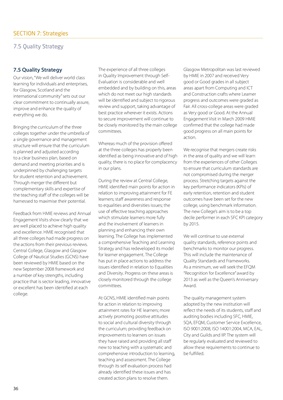
36
SECTION 7: Strategies
7.5 Quality Strategy
7.5 Quality Strategy
Our vision, "We will deliver world class
learning for individuals and enterprises,
for Glasgow, Scotland and the
international community" sets out our
clear commitment to continually assure,
improve and enhance the quality of
everything we do.
Bringing the curriculum of the three
colleges together under the umbrella of
a single governance and management
structure will ensure that the curriculum
is planned and adjusted according
to a clear business plan, based on
demand and meeting priorities and is
underpinned by challenging targets
for student retention and achievement.
Through merger the dif erent but
complementary skills and expertise of
the teaching staf of the colleges will be
harnessed to maximise their potential.
Feedback from HMIE reviews and Annual
Engagement Visits show clearly that we
are well placed to achieve high quality
and excellence. HMIE recognised that
all three colleges had made progress on
the actions from their previous reviews.
Central College, Glasgow and Glasgow
College of Nautical Studies (GCNS) have
been reviewed by HMIE based on the
new September 2008 framework and
a number of key strengths, including
practice that is sector leading, innovative
or excellent has been identii ed at each
college.
The experience of all three colleges
in Quality Improvement through SelfEvaluation is considerable and well
embedded and by building on this, areas
which do not meet our high standards
will be identii ed and subject to rigorous
review and support, taking advantage of
best practice wherever it exists. Actions
to secure improvement will continue to
be closely monitored by the main college
committees.
Whereas much of the provision of ered
at the three colleges has properly been
identii ed as being innovative and of high
quality, there is no place for complacency
in our plans.
During the review at Central College,
HMIE identii ed main points for action in
relation to improving attainment for FE
learners; staf awareness and response
to equalities and diversities issues; the
use of ef ective teaching approaches
which stimulate learners more fully
and the involvement of learners in
planning and enhancing their own
learning. The College has implemented
a comprehensive Teaching and Learning
Strategy and has redeveloped its model
for learner engagement. The College
has put in place actions to address the
issues identii ed in relation to Equalities
and Diversity. Progress on these areas is
closely monitored through the college
committees.
At GCNS, HMIE identii ed main points
for action in relation to improving
attainment rates for HE learners; more
actively promoting positive attitudes
to social and cultural diversity through
the curriculum; providing feedback on
improvements to learners on issues
they have raised and providing all staf
new to teaching with a systematic and
comprehensive introduction to learning,
teaching and assessment. The College
through its self evaluation process had
already identii ed these issues and has
created action plans to resolve them.
Glasgow Metropolitan was last reviewed
by HMIE in 2007 and received Very
good or Good grades in all subject
areas apart from Computing and ICT
and Construction crafts where Learner
progress and outcomes were graded as
Fair. All cross-college areas were graded
as Very good or Good. At the Annual
Engagement Visit in March 2009 HMIE
coni rmed that the college had made
good progress on all main points for
action.
We recognise that mergers create risks
in the area of quality and we will learn
from the experiences of other Colleges
to ensure that curriculum standards are
not compromised during the merger
process. Stretching targets against the
key performance indicators (KPIs) of
early retention, retention and student
outcomes have been set for the new
college, using benchmark information.
The new College's aim is to be a top
decile performer in each SFC KPI category
by 2015.
We will continue to use external
quality standards, reference points and
benchmarks to monitor our progress.
This will include the maintenance of
Quality Standards and Frameworks.
As a minimum, we will seek the EFQM
"Recognition for Excellence" award by
2013 as well as the Queen's Anniversary
Award.
The quality management system
adopted by the new institution will
rel ect the needs of its students, staf and
auditing bodies including SFC, HMIE,
SQA, EFQM, Customer Service Excellence,
ISO 9001:2008, ISO 14001:2004, MCA, EAL,
City and Guilds and IIP. The system will
be regularly evaluated and reviewed to
allow these requirements to continue to
be fuli lled.